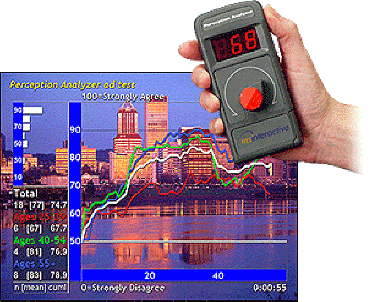Radio Perceptual Research
|
Perceptual
Research:
An eye into the listener's mind.
|
|
Music testing, whether an
Auditorium Music Test, callout or web based
polling, is what is called
"quantitative research." This is because the
results are "quantities" since the usable
result from the process is the score for each song ranked against
each other song on a variety of criteria like
age and sex and radio
usage. |
Sometimes we want opinions on the station
itself or its DJs and shows.
Those are harder to quantify and
require in depth interviews.
|
|
Many people are familiar with the concept of
the Focus Group which is simply a group of users or potential users
of a product who are brought together to give opinions on the
product category. |
|
 |
Here the moderator will face the group, or, sometimes individual
respondents, and follow a structured script of key points. The
decision to use individual interviews is generally based on the
desire to avoid group dynamics or to probe individual behavior more
in depth. The one on one process is, however more costly and vastly
more time consuming. |
|
 |
Focus Groups are conducted by a professional
moderator and generally taped for later analysis and review. Often,
participants use a dial to indicate positive or negative feelings
about the subject matter. Many of us saw the cable news channels use
the dial for the 2008 election campaign to measure a focus group's
reaction to debates and speeches. |
|
 |
While a Focus Group is being conducted, the
sponsor of the group (a radio station in our case here) may view via
video cameras or a one-way window the people participating, as well
as view the meter readings for the respondent dials. |
 |
While the client observes the interviews, the
research company staff, equipped with computers, will take extensive
notes and also use messaging to send instructions to the moderator
conducting the project. When finished, a research analyst will
prepare a summary of findings and present them to the client.
Sometimes, of course, the meetings "add" to the research findings by
forgetting that the base for this type of project is the listener. |
 |
Here is a "client room" where the camera is
showing one of the respondents in the perceptual project as they
give an opinion. The screen might also show the dial settings when
the respondent is listening to a morning show segment or examples of
different kinds of TV spots a station might run to promote itself.
Radio researchers have been known to survive over 150 meeting room
meals a year! |
|
|